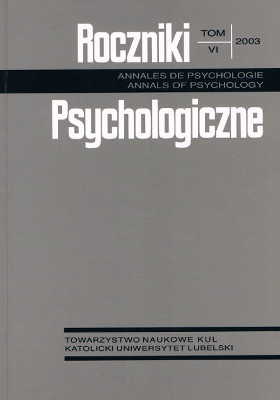Properties of self-knowledge in adolescents with moderate mental retardation and non-retarded adolescents
Abstract
The main purpose of empirical study was to examine the characteristics of self-knowledge of adolescents with mild mental retardation and without mental retardation. The basic assumption was that cognitive self-assessment and self-esteem are made by the individual in the context of other persons relations and that the development of personal identity is the process characteristic for each human being independent of his/her level of intellectual functioning or any cognitive disorder. So the study was conducting according to the developmental approach to analysis of behaviour of adolescents with mental retardation. The content of self-knowledge of 40 adolescents with mild mental retardation and 40 without mental retardation was examined (Self-Knowledge Questionnaire – SKQ consisting of 50 items). As results show the level of self-knowledge is relatively high in both examined groups and the extremely high level – in the sphere of social self-knowledge – is characteristic for adolescents with mild mental retardation. The analysis of similarities and differences between two groups show that there are two different clusters of persons, i. e. with high and low self-knowledge, and that the level of cognitive ability is not a differentiating factor. The most important difference between two groups of adolescents is connected with internal structure of self-knowledge. In the group with mild mental retardation this structure is more rigid with the central point of social self-knowledge. The important conclusion is that the feeling of being different is very strong among mentally retarded adolescents.
References
Brzezińska, A. (2000). Społeczna psychologia rozwoju. Warszawa: Wydawnictwo Naukowe Scholar.
Brzezińska, A., Krzywicki, P. (2001). Właściwości samowiedzy na przełomie późnej adolescencji i wczesnej dorosłości. Czasopismo Psychologiczne, 7, 87-94.
Brzeziński, J. (1980). Elementy metodologii badań psychologicznych. Warszawa: Wydawnictwo Naukowe PWN.
Brzeziński, J. (1996). Metodologia badań psychologicznych. Warszawa: Wydawnictwo Naukowe PWN.
Erikson, E. H. (1997). Dzieciństwo i społeczeństwo. Poznań: Dom Wydawniczy Rebis (wyd. I – 1950).
Erikson, E. H. (1968). Identity. Youth and crisis. New York–London: W. W. Norton and Company.
Erikson, E. H. (1987a). The human life cycle. W: S. Schlein (red.), A way of looking at things. New York–London: W. W. Norton and Company (wyd. I – 1968), s. 595-610.
Erikson, E. H. (1987b). Psychosocial identity. W: S. Schlein (red.), A way of looking at things New York–London: W. W. Norton and Company (wyd. I – 1968), s. 675-684.
Evans, D. W. (1998). Development of the self-concept in children with mental retardation: Organismic and contextual factors. W: J. Burack, R. M. Hodapp, E. Zigler (red.), Handbook of mental retardation and development. Cambridge, UK: Cambridge University Press, s. 462-480.
Giryński, A. (1976). Samoocena uczniów klas VIII szkół specjalnych. Szkoła specjalna, 3, 29-36.
Hodapp, R. M., Burack, J. A., Zigler, E. (1998). Developmental approaches to mental redardation: A short introduction. W: J. Burack, R. M. Hodapp, E. Zigler (red.), Handbook of mental retardation and development. Cambridge, UK: Cambridge University Press, s. 3-19.
Horowitz, F. D., Haritos, C. (1998). The organism and the environment: Implications for understanding mental retardation. W: J. Burack, R. M. Hodapp, E. Zigler (red.), Handbook of mental retardation and development. Cambridge, UK: Cambridge University Press, s. 20-40.
Jarymowicz, M. (1989). Próba konceptualizacji pojęcia „Tożsamość”. Spostrzeganie odrębności Ja–Inni jako atrybut własnej tożsamości. Przegląd Psychologiczny, 32, 655-669.
Jarymowicz, M. (2000). Psychologia tożsamości. W: J. Strelau (red.), Psychologia. Podręcznik akademicki (t. 3). Gdańsk: Gdańskie Wydawnictwo Psychologiczne, s. 107-125.
Kościelak, R. (1989). Psychologiczne podstawy rewalidacji upośledzonych umysłowo. Warszawa: Państwowe Wydawnictwo Naukowe.
Kościelska, M. (1984). Upośledzenie umysłowe a rozwój społeczny. Warszawa: PWN.
Kościelska, M. (1998). Oblicza upośledzenia. Warszawa: Wydawnictwo Naukowe PWN.
Krzywicki, P. (2000). Upośledzenia umysłowe. Nowe podejście rozwojowe. Edukacja i Dialog, 4, 37-40.
Obuchowska, I. (1999). Dzieci upośledzone umysłowo w stopniu lekkim. W: I. Obuchowska (red.), Dziecko niepełnosprawne w rodzinie. Warszawa: Wydawnictwa Szkolne i Pedagogiczne, s. 212-251.
Sęk, H. (1998). Wybrane psychodynamiczne teorie funkcjonowania jednostki i grupy oraz mechanizmy zaburzeń. W: H. Sęk (red.), Społeczna psychologia kliniczna. Warszawa: PWN, s. 43-69.
Witkowski, T. (1993). Rozumieć problemy osób niepełnosprawnych. Warszawa: Wydawnictwo MDBO.
Copyright (c) 2003 Roczniki Psychologiczne

This work is licensed under a Creative Commons Attribution-NonCommercial-NoDerivatives 4.0 International License.


